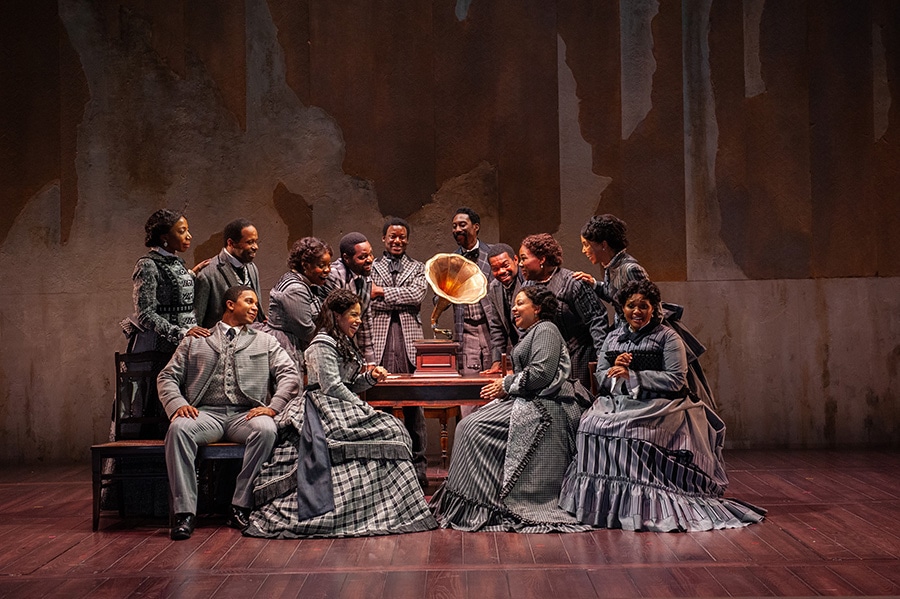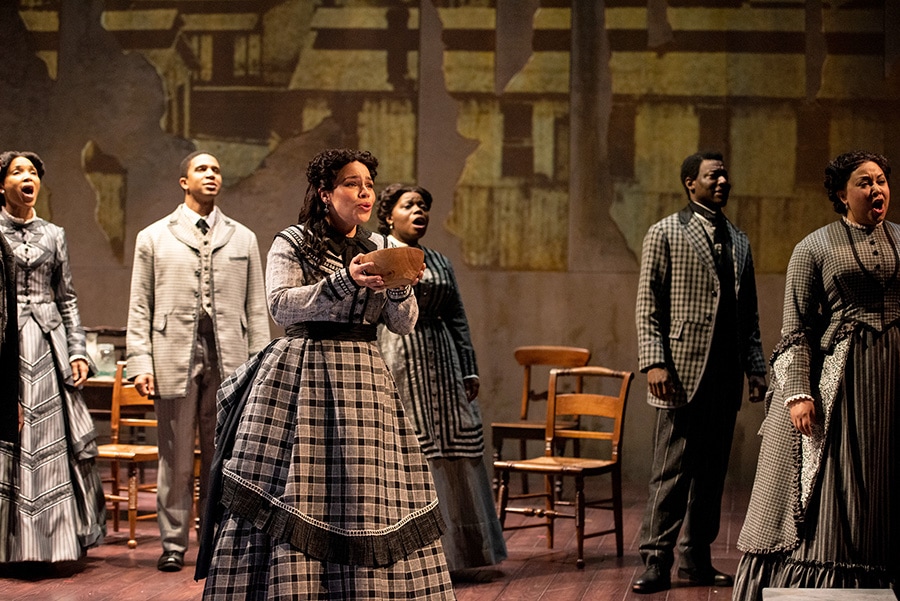In 1871, Fisk University – an all-Black institution of higher learning in Nashville, Tennessee – was in dire financial straits. To raise money for the institution, Treasurer and Music Professor George L. White organized a nine-person acapella group to take on tour. Singing Negro Spirituals and selling sheet music, the Fisk Jubilee Singers not only raised enough money to rescue the university but also to erect some of its first permanent buildings.

Playwright and Director Tazewell Thompson captures these early years of the Fisk Jubilee Singers as they toured throughout the United States and Europe and challenged the expectations of mostly white audiences by neither performing minstrelsy nor buffoonery. Nor did they attempt to perform sacred music. Instead, they performed music emanating from enslaved Africans and post-civil war southern Blacks. Thompson and Musical Director Dianne Adams McDowell have woven an indelible impression of the early “Jubs,” as they dubbed themselves, employing acapella singing and mostly monologues to convey both the collective and individual histories of the Jubs.
With a cast of thirteen impeccable singers presenting more than three dozen spirituals, like the warp and weft of a beautiful tapestry, both histories unveil the struggles and triumphs of the Jubs, the societal challenges encountered by the individual members, and the grace with which the group dealt with racism, violence, and poverty to emerge as one of the most coveted singing groups of the late 19th century.
Actress and singer Aundi Marie Moore as Maggie Porter on more than one occasion steals the show with her rich soprano voice portraying a character who wants to sing solos rather than blend her voice into the group. The historical Porter is referred to as the “diva” of the Fisk Jubilee Singers. Singer Moore embodies and delivers this diva quality.
In addition to portraying Jub singer Ella Sheppard, Lisa Arrindell seamlessly transforms into Queen Victoria, and then a Southern white woman hosting a tea for which the Jubs perform. Her British and upper-class Southern accents leave no doubt about who she is portraying. Travis Pratt a tenor playing Isaac Dickerson stands out among the male singers as a voice to pay attention to.
This production – which features minimalist props and limited wardrobe changes – is lifted by the imaginative execution of sound, lighting, and projection. The backdrop appears like a plaster wall upon which scenes of rainy and snowy outdoors, and images of a train, a ship, and a chandelier, among other things, are projected to orient the audience to place. Likewise, the lighting and sound embellish each scene creating the appropriate mood. Lighting and sound are particularly noteworthy during the scenes when the Jubs discover the “instruments of our enslavement,” and sell them as scrap iron and when they are attacked by a lynch mob. Set Designer Donald Eastman, Lighting Designer Robert Wirzel, Sound Designer Fabian Obispo, and Projection Designer Shawn Duan deserve much kudos for creating ambiances that draw in and hold the viewer.

Costume Designer Merrily Murray-Walsh manages to use a limited palette of gray, white, and black so effectively that the absence of primary colors in the costumes seems not to matter. This decision to use a limited palette conveys the poverty that the Jubs contended with, thus curtailing their wardrobe choices. Wig Designer Anne Nesmith also does a remarkable job of recreating the hairstyles of 19th-century Black women with chignons, and in one instance draping spiral curls on actress Katherine Alexis Thomas who starred as the youngest Jub, Minnie Tate.
While the cast delivers a spectacular repertoire of songs from the Fisk Jubilee Singers’ songbook, the production challenges the audience to become intimate with the histories of each of the thirteen singers. Since there is limited dialogue, which could function to name each character, and the characters’ names are not uniformly mentioned, keeping up with who is who can be taxing.
But, the beauty in the production are the songs. Because of the Jubs, the spirituals of an oppressed people did not vanish into the dustbins of memory. The Fisk Jubilee Singers did more than save a university, they indelibly marked American music with Negro Spirituals that survived and can be heard in many Black churches on Sunday morning. For this, and this alone, Thompson’s ability to transform this history to the stage and acquaint a broader audience to the accomplishments of this historical singing group is worth the price of the ticket.
Running time about 2 hours, with a 15-minute intermission.
Jubilee plays through June 9, 2019, presented by the Arena Stage, 1101 Sixth Street, SW, Washington, DC. For tickets, call (202) 488-3300 or go online.




